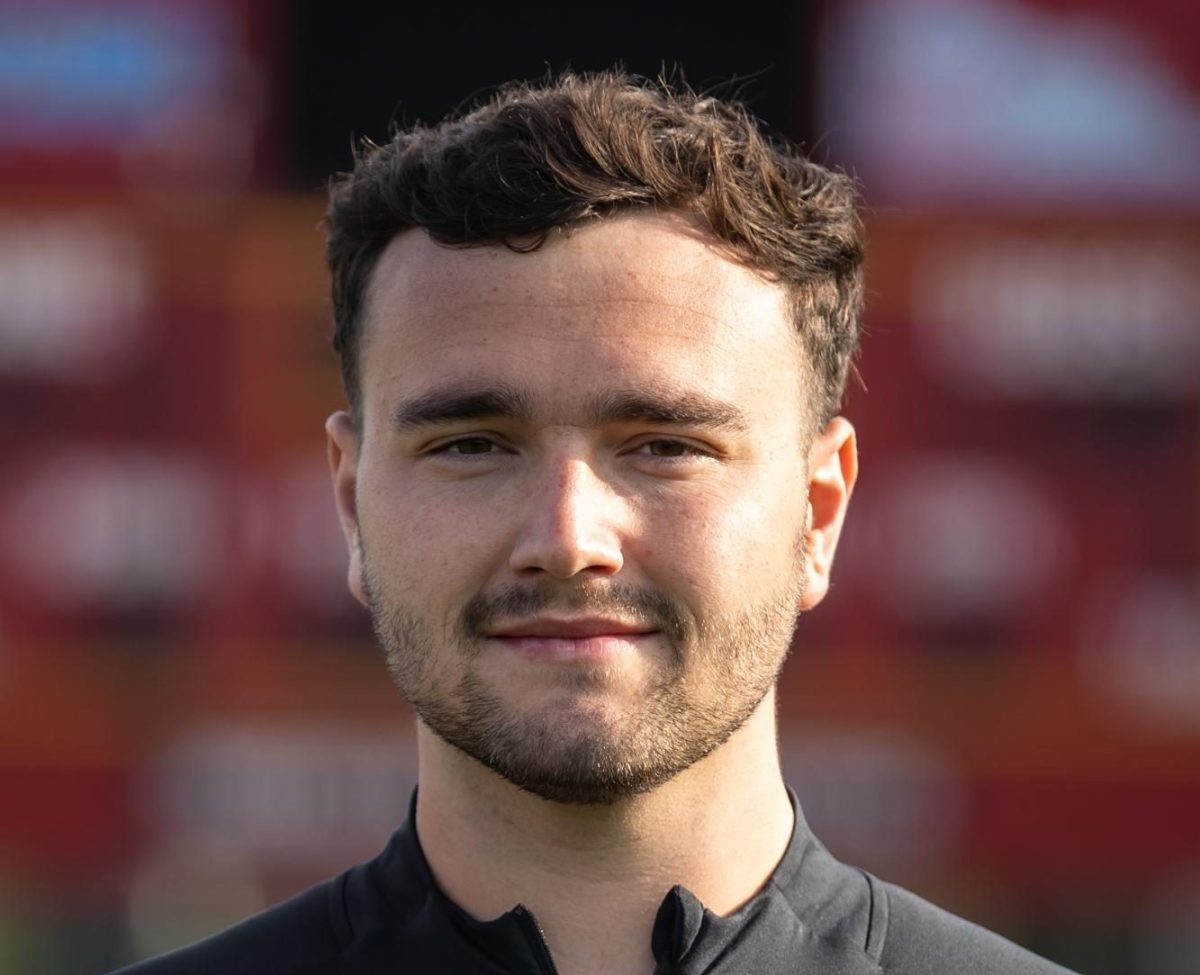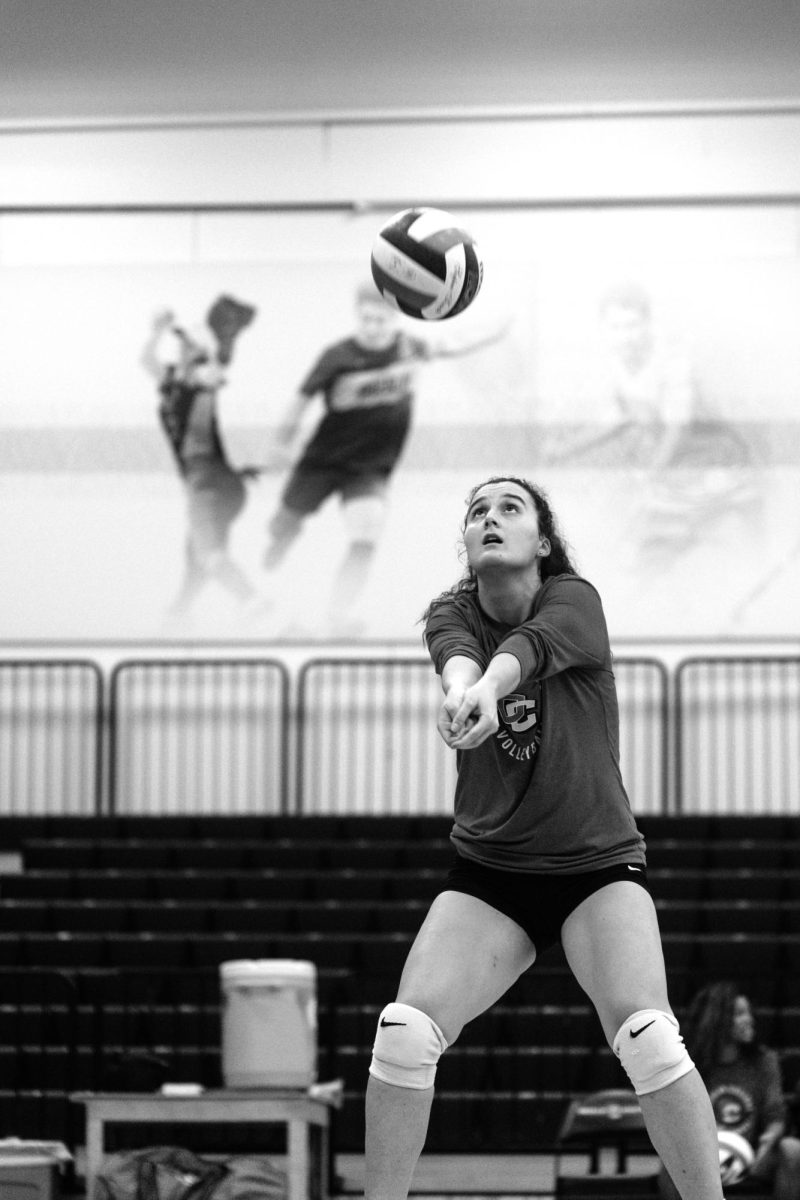Second-year Ryley Steggall has always been fast. Since she was little, every coach she had found ways to showcase her speed, whether it was stealing bases on the softball field, streaking past defenders on the soccer pitch, or sprinting past her competition on the track.
In her first year at Oberlin High School, Steggall worked with Head Track and Field Coach Christina Madison, who helped her foster a healthy relationship with the sport and improve her speed dramatically. Her coaching and leadership began paying off as Steggall and her close-knit team at Oberlin High School had an incredible 2019 season. Steggall’s 4×200 relay team ran at Regionals and nearly qualified for States. Three of that season’s team members, who had only gotten faster since Regionals, returned in 2020 and were poised to reach States in the spring. However, days after they competed in indoor States, the COVID-19 pandemic shut down schools, and the outdoor season was canceled.
Steggall stayed fit at home during the pandemic thanks to Chloe Ting’s ab workouts on YouTube, and she continued running as a way to get out of the house and stay ready for her next chance to run competitively. Still, she was growing increasingly frustrated with the opportunities that were passing her by. When the 2021 season finally rolled around and Steggall could run with the team again, she attacked the season with a newfound passion and vigor.
However, despite her desire to make the most of her season, Steggall’s relationship with track began to worsen due to her new coach. The coach’s methods were physically and mentally toxic. They became Steggall’s coach at about the same time as when she realized she wanted to go into the sports world as a future profession. She was moved by the 2019 exposé video that detailed the abuse American track star Mary Cain underwent as a runner in Nike’s Oregon Project. Cain was forced into an eating disorder by her coach, Alberto Salazar, and suffered immense mental torment at the hands of her male coaches.
“I was taking some career readiness class, and [my teacher] asked me, ‘What’s your why?’ and I was like, ‘This is my why,’” Steggall said. “No female athlete should have to go through this — the abuse in the sport system for women, and women runners especially — because it’s just so physically and mentally hard on you.”
Steggall’s coach mismanaged practice and created a hostile environment, which forced athletes to push their bodies beyond their capacity and refused to listen to feedback or account for how their athletes were feeling.
“We ran repeat 300s, multiple times a week,” Steggall said. “It was just pushing our bodies to the absolute limits. And he did not care what we had to say; we would try to talk to him about our workouts and it would go in one ear and out the other.”
The coach’s tactics were not only detrimental to Steggall’s mental well-being, but her track results were suffering as well.
“I think track can be very easily measured in success,” Steggall said. “You just run faster when you get better, and nobody was getting better because we were all in this horrible environment with this coach who just didn’t know what he was doing and wasn’t a good coach. Just generally bad vibes all around. And we were still in virtual school, so track and work were the only two things I [was] doing. Nobody was at a fantastic place mentally, and I was going to do this thing every day that I used to love doing and was now being broken apart by this man. It was quite a dark time for me.”
Steggall often left practice in tears, feeling completely defeated. Her relationship with herself, with food, and with the sport deteriorated quickly, and she began to struggle with her mental health.
“Going back to women, and specifically female athletes in sports, there’s a lot of evidence behind eating disorders and performances, and I think all of that combined in that little environment was not a good time for me,” Steggall said. “[Second-year] Anna [Fritz], who I now run with at Oberlin, we’d talk every day and say ‘When are we going to quit? I’ll quit when you quit, haha,’ but there were points where it wasn’t a joke. It was bad, and this wasn’t a place we should be. I’d come home crying to my mom every day and just be like, ‘I hate this.’”
Due to the trauma of her junior year experience, Steggall ultimately didn’t run at all her senior year, even though she understood that few schools would take her seriously as a recruit having not run in her last year. She narrowed her focus in her college search to academics and hoped that she could still run in a club team setting. After committing to Oberlin, Steggall was contacted by Ben Wach, an assistant track and field coach focusing on sprints and hurdles. Wach invited Steggall to come meet with him and talk about potentially joining the team.
Steggall was initially against running competitively again and wasn’t planning on replying to Wach’s message until her mom convinced her that there was no downside to at least talking to him.
Their conversation started out in one of the worst ways possible — Wach said that he is a New York Yankees fan. Steggall is a die-hard Boston Red Sox fan, so knowing her potential coach was her sworn baseball enemy was a big bump in the road. However, he was funny, kind, and completely understanding of her reason to not run her senior year.
Even though Steggall’s visit ultimately went well, she had no intentions of actually joining the team, contrary to what she told Wach.
“I said, ‘Yeah, I’ll consider joining the team,’” Steggall stated. “At this point, I was lying to this man’s face. I was not planning on joining the team. I actually text Anna and I’m like, ‘Girl, if I’m doing this you’re doing this. If I join this team, you have to join it, too.’ I’ve actually talked with her recently and she said, ‘Yeah, I technically committed to the team over the summer but thought there was no way I’d actually be running in college.’ Going to those first couple of practices, I was like, ‘We’ll see how this goes, but no promises.’”
In her first week with the team, Steggall’s time was about what she ran as a high school junior, since she hadn’t trained on a regular basis in nearly two years. However, her teammates seemed to care much more about her as a human being than about what time she was running.
“The team environment and atmosphere — and I’m not saying this as an ‘Oh my god, we’re so cool’ — I genuinely don’t think I would’ve found it anywhere else,” Steggall said. “I’m so dead serious when I say I was not going to run in college and the only reason I did is because of the program we have here. Any other school, I would’ve been like, ‘No, no thanks.’ But what we have here and what the coaches and teammates have fostered here, it’s something really, really crazy.”
Steggall credits the majority of her success to Wach, who is now her mentor, coach, and trusted advisor.
“I’ve bared my soul to Ben Wach,” Steggall said. “Debatably, that man knows too much about me, but it’s okay. He does a really, really good job of balancing — crazy! — so we are not working out every day. We have a full rest on Sunday, two recovery days during the week, and Monday, Wednesday, Friday are normally our go-hard days, but he is really good at understanding athletes. We have little check-in meetings every couple of weeks where he’s like, ‘So, tell me about your life. Tell me about who you are.’ And those are always really eye-opening and I think him putting people before athletes is really what makes this team fantastic. He does not get enough kudos for all that he does. He’s actually incredible and I could not imagine a better coach.”
Steggall’s growth and development on the team reached its peak last weekend at the team’s first meet of the season at Case Western Reserve University. Heading into the meet, her three goals were to have fun, stiffen her core when running, and be kind to herself.
“A big part of track for me has been mindset, and trying to get in the mindset that this is something that I love to do and something I have a support system around and making sure the relationship I have with it is very healthy,” Steggall said.
After competing in the long jump, which she says is not one of her best events, Steggall began mentally preparing for running the 60-meter dash.
“I remember walking up to that 60 and being like, ‘Yeah, I’m gonna eat this the f*** up,’” Steggall said. “Honestly, I went in there with a lot of confidence because I was like, ‘This is my event.’ I think coming off of something I didn’t do super well on because it was so new and [then] going to something I felt super comfortable with, I was like, ‘This is all me.’”
Steggall’s personal record in this event was an 8.32, which was good enough to give her the sixth seed in the race. After winning her heat by running a PR of 8.19, she qualified for the final race and knew she had absolutely nothing to lose. Still brimming with confidence, Steggall stepped up to the line, did her routine, and locked in.
When the race was over, she knew that she’d finished in the top two, but wasn’t sure if she had beat the girl two lanes over — until she saw Wach.
“I walk back to Coach Wach and [Assistant Track and Field Coach] Izzy Alexander, another one of our coaches, and she said, ‘Ryley, you won,’” Steggall said. “And I look back at the time and it’s 8.05. And I actually start cussing my coach out. I was actually losing my mind and could not process anything. It’s as if I was in a daze. I was so excited, I was so happy, but looking at the numbers of this, it’s wild.”
After beating her personal record by nearly three-tenths of a second in just one meet, Steggall turned her attention to the 200-meter race, which she was placed in the fastest heat for. “Fruit snacks, applesauce, and adrenaline” were all that she was running on for this race, but the motivation she needed came from her captain, fourth-year Myranda Montoye.
“Myranda, one of our captains, goes, ‘Ryley, why not just win it? You’re gonna have to run the race anyways, why not win it?’ I didn’t come out of the blocks very fast, but I was still feeling good, and I hit the second curve and I am just neck-and-neck with the girl next to me,” Steggall said. “I was like, ‘Girl, you have to fight for this, you have to want this. Do you want this?’ And I was like, ‘Yeah, I do.’ So I kick it into high-gear, and at this point there is a tear going down my face because the 200 is so fast and there are so many curves. And then I win. My indoor PR last year was a 28.1 and I ran a 27.2. My outdoor PR is a 27.1, so we’re edging onto it.”
Since she persevered and continued her track career at Oberlin, she has not only flourished as an athlete, but has involved herself in multiple athletic spaces on campus. She works with Athletics Communications, and she is the community outreach officer and Student-Athlete Advisory Committee liaison for the Queer Student Athlete Group.
Since running two new personal records and winning both her events, Steggall is now looking forward to improving on those results and dominating more events as a team.
“I’m really excited for this season, I think we’re going to do well,” Steggall said. “I think [we] collectively, as a team, have a really good season ahead of us. Our goals are to win [our] conference, but I think really every year it’s always just about being supportive and, as we like to say, making every meet a home meet. We have so many people who travel to go cheer on each other and their teammates. So I think this season is all about performing well, being a good teammate, and helping others perform well. I’m excited to see where it goes.”













